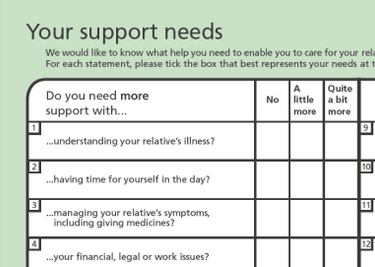The Carer Support Needs Assessment Tool Intervention (CSNAT-I)
Enabling tailored support for carers in everyday practice

What is the Carer Support Needs Assessment Tool Intervention (CSNAT-I)?
CSNAT-I is an intervention for supporting carers (family members/friends in an unpaid supportive role), delivered using a five-stage person-centred process of assessment and support. The intervention uses an evidence-based, comprehensive tool (the CSNAT) comprising 15 domains (broad areas of support need). The tool enables carers to identify, express and prioritise domains where they need more support. Then a needs-led conversation explores the carer’s individual needs and what they feel would be helpful, enabling the delivery of tailored support.
There is also a CSNAT-I Paediatric for parents/ carers of children with a life limiting illness (see FAQs below). All principles and procedures for CSNAT-I also apply to CSNAT-I Paediatric.
CSNAT-I is introduced to the carer, as the start of a conversation about support the carer may need, separate from the needs of the patient. The CSNAT (the tool itself) is given to the carer to complete
The carer considers the 15 evidence-based questions on the tool and indicates whether they need more support in any of the domains. Then carers are asked to consider and prioritise which of the domains they most want to discuss with a practitioner.
The assessment conversation is a needs-led conversation. The focus is on the domains prioritised by the carer, not all tool domains. The practitioner explores the carer’s individual support needs in each of the prioritised domains and what the carer would find helpful in meeting those needs.
Shared action planning documents the conversation with the carer. The carer’s individual needs that have been identified and the agreed actions taken to meet those needs are recorded on the CSNAT-I Support Plan.
We know that carers’ needs change over time, so the Support Plan should be reviewed for effectiveness and consideration given to repeating CSNAT-I at another point in time.
The CSNAT is an evidence based, comprehensive tool comprising a set of domains (broad areas of support need) in which carers commonly say they require more support. It acts as a prompt for carers to indicate where they need more support.
The tool was developed and validated in a series of research studies working with bereaved and current carers of patients with cancer and palliative conditions including COPD and MND/ALS.
The current version of CSNAT (v3.0) has 15 domains and includes an ‘anything else’ section where carers can write in any support need not covered by the other domains. It uses a simple question and answer format to ask which areas carers need more support with and what are their priorities for discussion.
CSNAT (v3.0) is intended for use with carers of people with chronic and progressive conditions, including cancer.
The CSNAT is protected by copyright, which is why only an extract is shown here. Go to the Licensing section to download an inspection copy of the full CSNAT.

CSNAT-I is used mostly as an intervention for practice where the purpose of the tool (CSNAT) is to help carers identify and express their support needs to a practitioner.
It acts as a prompt to help start a needs-led conversation about carers’ unmet support needs which can then enable support to be tailored to meet their specific needs.
Watch this video on the benefits of using CSNAT-I for carers and practitioners, explained by Kay Greene, formerly Director of Clinical Services, Mary Ann Evans Hospice.
No. Training, licences and the tools themselves are made available, free of charge, to health and social care providers, charities and researchers from non-commercial organisations. All CSNAT licences are non-commercial licences only. We are not releasing any version of the CSNAT for commercial use.
Yes – but this requires:
· training for practitioners and
· organisations need to have a licence in place for its use in practice.
This applies to all versions of CSNAT-I, including CSNAT-I Paediatric.
Please use the links at the bottom of this page to go to sections on CSNAT-I Training for use in practice and CSNAT Licensing.
Yes, but organisations need to have a licence to use the CSNAT in a research study because the tool itself is protected by copyright.
This applies to all versions of the CSNAT, including the CSNAT Paediatric.
Please use the link at the bottom of this page to go to the sections on Using the CSNAT in a research study and CSNAT Licensing.
For use in a practice context, CSNAT-I Paediatric is an intervention for supporting parents/carers of children with a life limiting illness. The intervention integrates an evidence based, comprehensive tool, the CSNAT Paediatric, comprising 16 domains of support need. CSNAT-I Paediatric is delivered using the same five stage person-centred process of assessment and support described above.
The same conditions for training and licensing apply for use of CSNAT-I Paediatric in practice. The tool itself, the CSNAT Paediatric can also be used as a ‘standalone’ research tool to identify domains of unmet support need. Please use the links at the bottom of this page to go to sections on CSNAT-I Training for use in practice and CSNAT Licensing.